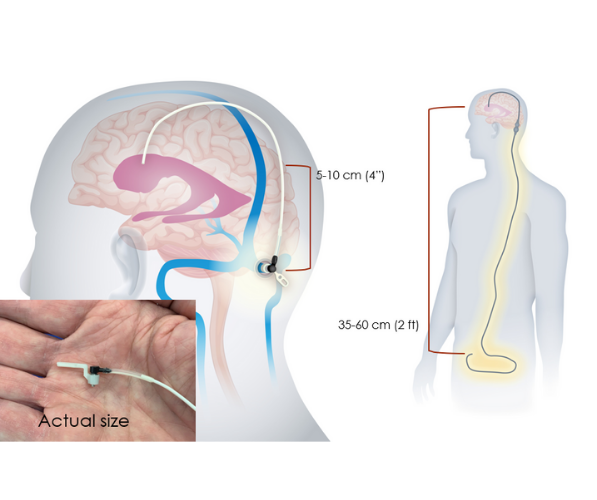Success Story
Penn State Startup Aims to Improve Treatment of Hydrocephalus
Normal Pressure Hydrocephalus (NPH) is a disease resulting from too much cerebrospinal fluid (CSF) around the brain and affects roughly 750,000 Americans, typically those over 65 years old. Symptoms are often confused with Alzheimer’s, but in many cases are reversible with the placement of a shunt.
Unfortunately, Hydrocephalus shunts have the highest failure rate of any medical device being implanted today with 40 percent failing by the end of year one and 98 percent by the end of 10 years. Penn State researchers are developing a new technology called “HydroFix,” an advanced surgical shunt system designed to mitigate the many risks associated with the current shunts on the market, providing a durable treatment solution for NPH patients. The researchers have founded the startup Cranial Devices, Inc. and are seeking a license to the HydroFix technology from Penn State.
“There are many long-held medical perceptions regarding treatments for a variety of ailments people experience,” said Barry Fell, president and co-founder of Cranial Devices, Inc. and a consultant for the Surgical Innovation Group in the Department of Surgery at Penn State Health Milton S. Hershey Medical Center. “And many are appropriate for good reasons, but new advancements truly need to be considered by referring physicians because of their efficacy and resulting positive outcome for patients.”
CSF is a clear fluid surrounding the brain and spinal cord, which cushions the brain and spinal cord from injury while serving as a nutrient delivery and waste removal system for the brain. When CSF doesn’t drain properly, NPH can result – leaving the patient confused and disoriented with an unstable gait and incontinence – all significantly affecting their quality of life. NPH is treatable and, in many cases, the symptoms are reversible with the correct placement of a shunt to properly “control the drain” of CSF.
The HydroFix technology was developed by Fell, alongside Dr. Randy Haluck, Dr. Elias Rizk, and Dr. Sprague Hazard of the Penn State College of Medicine. Cranial Devices Inc. was co-founded by Fell and Dr. Haluck, professor of surgery at Penn State College of Medicine, in November 2020 to address a $1+ billion market opportunity to treat NPH with a novel CSF drain, which eliminates complications associated with siphoning and over-drainage. Nationally, Hydrocephalus patients suffer one year reoperation rates as high as 74 percent, which generates hospital charges in excess of $3 billion nationwide.
Cranial Devices recently took first place at the 2021 Invent Penn State Venture & IP Conference Tech Tournament and the $75,000 grand prize. The Tech Tournament features eight of Penn State’s most disruptive technologies and promising early-stage companies competing for $150,000 in prizes.
As co-founders of SIG Medical Corp., Fell and Dr. Haluck are no stranger to transforming the way things are done in the medical field. In 2019, they successfully commercialized a novel device, instrument set and technique to allow for a minimally invasive approach to fixing broken or damaged ribs. That device won the very first Tech Tournament during the inaugural 2016 Invent Penn State Venture & IP Conference and went on to be acquired by Zimmer-Biomet in 2019 and is now in-use today.
Fell said the growing medical science entrepreneurial commitment at The Center for Medical Innovation, the Penn State Office of Technology Management, the Office of Entrepreneurship and Commercialization, Penn State Health and the Penn State College of Medicine is enabling the scientific community to advance innovations that positively impact human health.
“It really does take a team to advance an idea like HydroFix and the folks at the Center for Medical Innovation in Hershey were very helpful,” said Fell. “Kevin Harter, associate dean of Medical Innovation at Penn State College of Medicine and Erika Swift, associate director of the Center for Medical Innovation at Penn State College of Medicine, who help administer the National Science Foundation’s Innovation Corps (I-Corps™) program at the Hershey campus, supported HydroFix’s journey to help us arrive at the tipping point of commercialization.”
Dr. Haluck also points to the Penn State Research Foundation, as well as Dustin Ritter, technology licensing officer in the Penn State Office of Technology Management and Harl Tolbert, assistant vice president for research and director of the Office of Technology Management, as key partners in Cranial Devices’s success.
“We’re hopeful at the Office of Technology Management that the HydroFix technology will be successful in addressing a significant unmet clinical need, and we’ve been particularly impressed with Barry and Dr. Haluck’s diligent efforts to look at the problem from every angle, talk to key opinion leaders in the field, and really hone in on a strong product-market fit,” Ritter said.
Cranial Devices is also participating in the Startup Leadership Network’s 2021 Board of Advisors program, gaining access to a virtual board of advisors comprised of successful alumni and serial entrepreneurs.
“Those folks, with Jim Pietropaolo, who launched the Startup Leadership Network (SLN), enabled us to tap a goldmine of successful alumni entrepreneurs,” Haluck said.
Pietropaolo, associate director of the Office of Entrepreneurship and Commercialization, launched the invitation-only SLN in 2018 to match emerging Penn State-supported companies with executive talent. They meet with Penn State tech startups and provide guidance to accelerate market entry.
“We might have more than 60 projects we’ve reviewed since we began the Surgical Innovation Group in 2009 with several of them progressing toward commercialization,” said Fell. “HydroFix is one that certainly has gone the distance and can fulfill the University’s promise of improving humankind.”
Both Dr. Haluck and Fell admit key factors in their success is rooted in the notion of not knowing everything. “We’re both very willing to check our egos at the door and be incredible, thoughtful listeners, who are willing to learn,” said Dr. Haluck. “We understand the enormous benefit HydroFix can have on patients’ lives, while delivering a cost-effective and valuable solution for hospitals and doctors. It’s fun to imagine new ideas that can save lives.”






